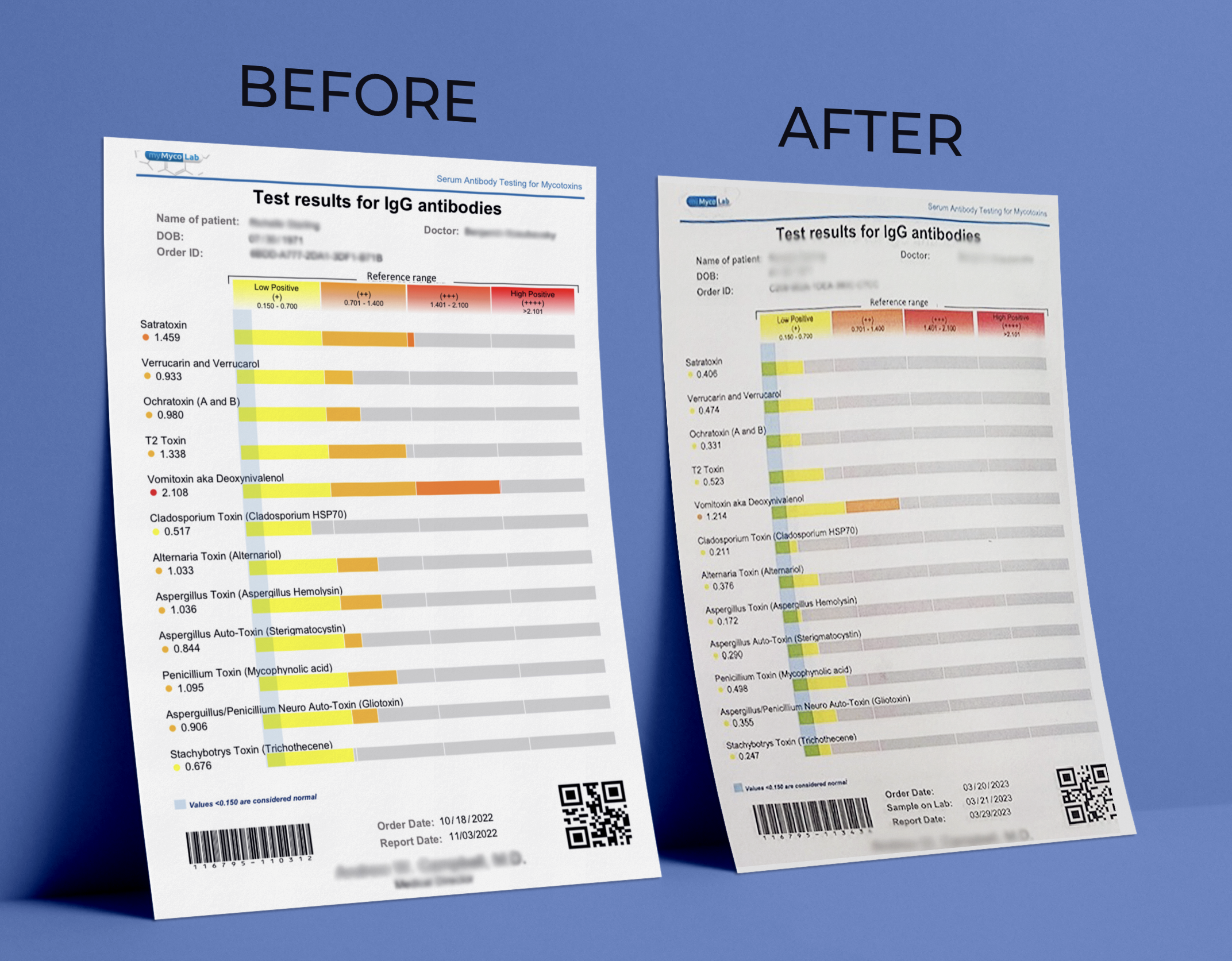Naturally occurring mycophages are viruses that live inside your body and are known as “mold-eaters.” These mycophages can be induced to target and kill fungi, molds, and yeasts using customized mycophage inducers. These inducers are tailored to your unique infections, turning the mycophages already present in your body into mold assassins. The mold tests accompanying this article show the before and after results of the mycophage-inducer treatments, customized for a woman who tested positive for every type of fungal infection the lab could identify. Despite undergoing aggressive pharmaceutical treatments that only worsened her symptoms, the customized mycophage inducers targeted each specific mold type in her body. This rapidly and gently eliminated the infections, dramatically improving her symptoms.
The patent-pending technology behind the development of the customized mycophage-inducer treatment is completely non-toxic and non-allergenic. Currently, it is exclusively available at the Biologix Center for Optimum Health, where ongoing IRB-supported research is being conducted.
In contrast, prescription anti-fungal and mold medications are among the most toxic in the pharmaceutical realm. When someone is combating mold overgrowth and taking these prescription medications, their physician must conduct frequent lab tests to ensure the medications are not harming the liver. Thus, conventional treatments can sometimes pose risks comparable to those of the fungal infection itself.
Mycotoxins are secondary metabolites produced by mold spores, which weaken and harm our health. They are potent and can cause significant damage to our organs and systems.
Mycotoxins can have a range of toxic effects. These include being:
- Carcinogenic: causing cancer
- Hepatotoxic: harmful to the liver
- Immunotoxic: harmful to the immune system
- Dermatoxic: harmful to the skin
- Teratogenic: causing fetal abnormalities
- Neurotoxic: harmful to the brain and nervous system
- Estrogenic: leading to elevated levels of estrogen
- Hemorrhagic: causing internal bleeding and bruising
- Nephrotoxic: harmful to the kidneys
- Mutagenic: causing genetic abnormalities
Blood tests for mycotoxins have been in use for the past 20 years and are highly accurate. The specificity and sensitivity of blood serum tests for the presence of IgG and IgE antibodies to mycotoxins are outstanding.
We test for IgG and IgE antibodies against 12 mycotoxins, providing a total of 24 test results.
Mycotoxins originate from:
- Penicillium (e.g., mycophenolic acid)
- Alternaria
- Aspergillus (e.g., gliotoxin)
- Stachybotrys
- Cladosporium
- Aspergillus auto-toxin
- Aspergillus/Penicillium neurotoxic mycotoxin
- Ochratoxin
- Satratoxin
- T-2 Toxin
- Vomitoxin
- Verrucarin and verrucarol
For example, Penicillium produces mycophenolic acid, patulin, and gliotoxin, while Alternaria produces alternariol and gliotoxin. Effects on the vascular system include increased vascular fragility and hemorrhage into body tissues or from the lungs due to satratoxin. The digestive system can experience diarrhea, vomiting, intestinal hemorrhage, liver impacts, caustic effects on mucous membranes from the T-2 toxin, and anorexia due to vomitoxin.
Mycotoxins can also affect:
- Respiratory System: causing respiratory distress and bleeding from the lungs, primarily due to trichothecenes.
- Nervous System: leading to tremors, incoordination, depression, headaches, and seizures, predominantly from trichothecenes.
- Cutaneous (Skin) System: resulting in rashes, a burning sensation, skin sloughing, and photosensitization mainly from trichothecenes.
- Reproductive System: causing infertility and changes in reproductive cycles due to the T-2 toxin.
- Immune System: leading to changes or suppression from various mycotoxins.
Symptoms of Mycotoxin Exposure
- Fatigue
- Short term memory loss
- Brain “fog”
- Headaches
- Easily confused
- Blurred vision or visual episodes
- Seizures
- Loss of equilibrium
- Feeling “spaced out”
- Muscles and joint aches and pains
- Intolerance of bright lights
- Decreased libido
- Sores that will not heal, rashes
- Shortness of breath
- Cardiac arrhythmias
- Mood swings, personality changes
- Tremors
- Abdominal pain and discomfort
- Hair Loss
- Numbness and Tingling in hands/feet
- Nosebleeds
- Chronic sinusitis, severe nasal allergies
- Sleep disturbance
- Painful lymph nodes
- Low-grade fever or feeling hot often
- Uncomfortable or frequent urination
Lyme Disease
Many patients with chronic Lyme disease might actually be suffering from mycotoxicosis. The symptoms are similar, and if Lyme treatments (targeting bacteria) fail, mycotoxins might be the actual culprit.
AUTISM (ASD)
Children with autism often have elevated mycotoxin antibody levels, as revealed in a recent study of 172 autistic children. These antibody levels are included in the mycotoxin serum blood test panel.
MYCOTOXINS AND OTHER ILLNESSES
- Alzheimer’s Disease: Exposure to molds and mycotoxins is linked with Alzheimer’s disease.
- Asthma: Asthma, especially in children, can frequently result from exposure to molds and mycotoxins.
- Fungal Sinusitis: Studies have demonstrated that molds cause sinusitis and are more prevalent than previously believed.
- Multiple Sclerosis (MS): Research indicates that exposure to molds and mycotoxins is a risk factor for MS.
- Obesity: The impact of mycotoxins on gut bacteria (gut microbiome) can often lead to obesity.
Reference: https://mymycolab.com/about_mycotoxins
Ready to schedule your appointment? Call us at (855) 993-3285 or schedule a call with our patient care team.
Remember, your health is our top priority, and together, we can restore your body’s innate potential for optimal well-being.





